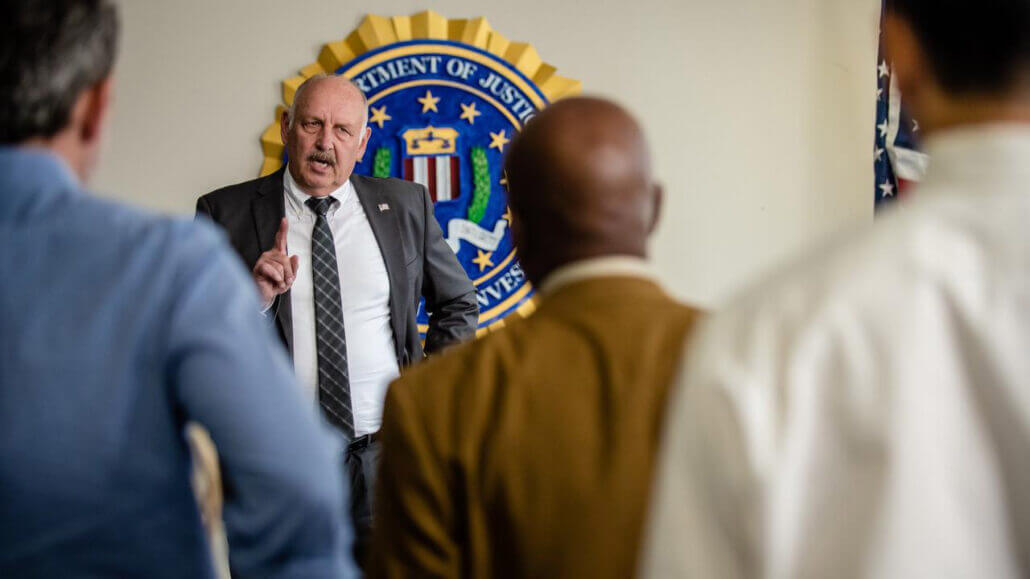American Greatness sat down with filmmaker Dinesh D’Souza for an exclusive interview about his latest film, Police State, which opens in theaters October 23 and 25. Find showings in your area at PoliceStateFilm.com.
AG: Is it dangerous for you personally to make a movie like this in the current environment?
DD: Well, there’s no question that taking on the police state in a frontal way creates alarm among the people who are running the police state.
And the more effective that the film is, the wider its reach, the more impactful that it is, the more it’s going to freak those people out because they already have so-called MAGA Republicans in their sights. Presumably, MAGA Republicans who are actively doing things like making movies are far more dangerous than MAGA Republicans who are inert and sitting at home and maybe, you know, just sounding off about what’s going on in the country.
So I’m very aware that this is a movie that is a little dangerous to make in the current environment.
AG: But if this truly was a police state, wouldn’t you not even be allowed to make a movie like this?
DD: I concede that we are not in fact in a full-fledged police state. We are in a police state that still has to run a masquerade.
When a police state is fully established, it doesn’t need to do that. Stalin doesn’t have to give you a reason why he’s arresting you. They just grab you and they yank you out of your home and they take you off to the gulag.
But a police state that is in the making, under construction, and not “there yet” is going to have to put up all kinds of facades and fronts. And so it’s a police state that will say, “we’re doing this to save democracy. You see, the opposition party is a threat to democracy and we are the saviors of democracy.”
Or, “we’re going after the leader of the opposition party because no one’s above the law. See, we don’t really want to arrest him. We’re obligated to because after all, we are lawful people and the law is pointing us in this direction.”
Or, “we’re not really advocates of censorship per se, but see, we got to stop all this dangerous misinformation and disinformation. So we are really pioneers of truth who have been sort of driven to censorship to protect the truth itself.”
So these are all ways in which the brutal practices of our police state, veiled under a kind of impression that they’re operating under rule of law to save democracy and to preserve the truth itself.

AG: If someone had told you even five or ten years ago that you’d be making a movie like this, would you have been surprised?
DD: I honestly wouldn’t have believed, prior to the 2020 election and prior to Biden coming to office, that I’d be making this movie. As I said, even under Obama, I saw that there was an attempt to engineer some of the weaponry of government against critics.
We saw the IRS, for example, go after Tea Party groups around the country, and, again, when the IRS is doing that, they’re sort of doing audits, and they are still operating within the machinery of government.
This is not the same as unleashing the most terrifying power that the state has, which is to seize you by force … to lock you up in a dark room and, in some cases, keep you there for as long as they deem appropriate.
Police states ultimately go to war against their own citizens and ultimately they turn the whole country into a prison. So the prison is a very appropriate symbol of the police state.
Now, except for my case where I was in a confinement center for eight months overnight, that didn’t happen under Obama, but it has happened under Biden.
So, I don’t think I would have had this diagnosis prior to 2020. I don’t think I could have really made this film, nor would it strike a chord had I made it prior to the Biden regime, which really shows that we have seen a speedy introduction of the police state on many different levels.
This is not just a film about the FBI. It’s not even just a film about the police agencies of government. When you look at something like censorship, you are dealing first of all with tons of government agencies. The State Department is involved. The White House is involved. The Defense Department is involved. Homeland Security is involved. The Cyber Security and Infrastructure Agency, CISA, they’re involved. The CDC, the health authority, is involved.
Not only that, academia is involved, the nonprofit sector is involved, the media is involved, the digital platforms are involved. Very often a single act of censorship is going to be a bunch of academic researchers producing a long list of names.
These are the disinformation providers. The government gets a hold of that list and consolidates it. They make a handoff to the Stanford Internet Observatory, or the Virality Project, and these non profits hand off to the digital platforms, that then de platform you, censor you, shut down your channel, all to the applause and cheerleading of the media.
So, we’re not dealing with a simple state apparatus, we’re dealing with an octopus that is sprawling across multiple sectors, including the private and the public sector.
In Part 2 of our Q&A with Dinesh, we discuss the Left’s portrayal of Donald Trump as “authoritarian,” Gen. Mark Milley’s criticism of Trump as a “wannabe dictator” … and more…
